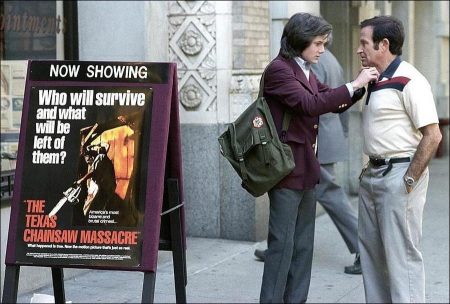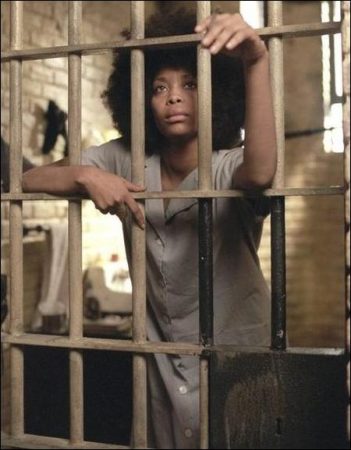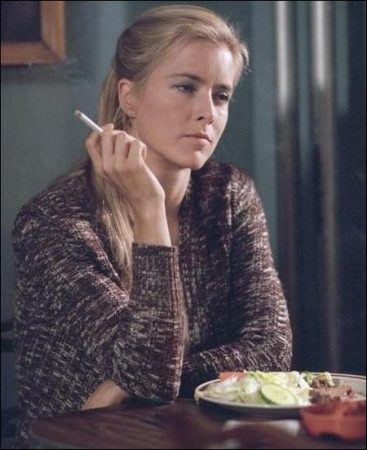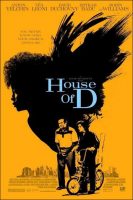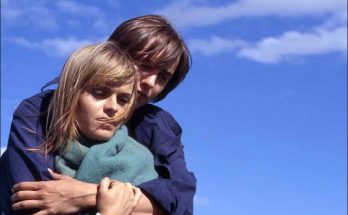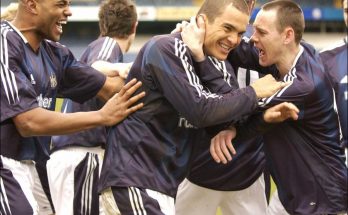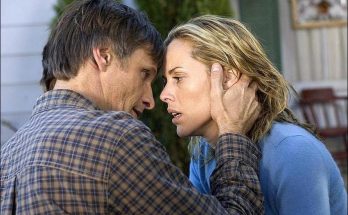Taglines: See the world a little differently.
House of D movie storyline. The year is 1973, and thirteen-year-old Greenwich Village native Tommy Warshaw (Anton Yelchin) is on the brink of becoming a man. While his bereaved single mother (Téa Leoni) continues to mourn the death of his father, Tommy escapes his own grief by causing trouble at school and making afternoon meat deliveries with his best friend Pappas (Robin Williams), a mentally challenged janitor.
Following the romantic advice offered by Lady (Erykah Badu) – incarcerated in the infamous Greenwich Village Women’s House of Detention for shadowy reasons – Tommy even experiences his first taste of love. Yet when an unexpected tragedy radically alters his world, Tommy must make a life-defining choice – one that will compel the adult Tom Warshaw, thirty years later, to confront his unfinished past. Vividly capturing the spirit of youth in all its joy and heartbreak, HOUSE OF D examines with humor and pathos a boy’s harrowing coming of age and the manner in which it defines his adulthood.
House of D is 2004 coming-of-age comedy-drama film directed by David Duchovny as his directorial debut in film. The film stars Duchovny, Anton Yelchin, Téa Leoni, Erykah Badu, Frank Langella, Zelda Williams, and Robin Williams. It was screened at the 2004 Tribeca Film Festival.
The film was released in theaters on April 15, 2005. It grossed $36,371 during its opening week. The next week it grossed $7,441. In the film’s third week, it grossed $210,826, the most during its run. In the film’s fourth and final week, it grossed $30,386, a total of $389,199 worldwide.
About the Production
The filming of HOUSE OF D was a “coming home” for director, writer and co-star David Duchovny. Much like Tom Warshaw, HOUSE OF D’s protagonist who returns to New York to revisit the place of his childhood, Duchovny made his own nostalgic journey back to Greenwich Village, his childhood home, to shoot his highly personal debut feature.
“Nothing’s like New York,” says Duchovny, smiling. For the actor, shooting a film in the city has been a life-long dream. “I’ve done the bulk of my acting in LA and Vancouver, but I always wanted to work in New York. I have the city in my head and in my heart from growing up. And I got to spend four months there this time. It was great.”
HOUSE OF D, a nostalgic coming of age story about a boy’s misadventures in 1970s Greenwich Village, is not an overtly autobiographical film. However, Duchovny did use recollections from his adolescence as a starting point for the story, particularly his memory of the Women’s House of Detention, a women’s prison once located in the heart of Greenwich Village.
Says Duchovny, “The women prisoners used to hang out at the bars and talk to people; pass the time, talk to their pimps, their lovers, whatever. And I thought, what if a little boy needed a mentor, another voice in his life, and a faceless, nameless woman prisoner became that? I thought that was an interesting relationship, and from there everything else kind of grew.”
Duchovny plays the adult Tom Warshaw, a New York native who, after years in selfimposed exile in Paris, finally reveals his turbulent coming of age to his French wife. “He’s trying to figure out what’s gone wrong with his marriage and with his family, and the key to it lies in telling his wife the true story of how he grew up and became a man,” says Duchovny of his character. “He tells her what really happened to him because he’s been lying to her for as long as he’s known her.”
“Tommy’s boyhood is essentially taken from him as an adult,” adds Robin Williams, who plays Tommy’s mentally handicapped friend, Pappass. “He’s disconcerted by not having a sense of his roots. And finding them again is an important thing for him. You find out he had some pretty dark and also some wonderful things happen to him.”
Vaulting back into 1970s Greenwich Village, the bulk of the film follows the 13-year-old Tommy, played by Anton Yelchin, as he navigates the difficult transition into adulthood. “This is a coming of age story,” says Duchovny. “So the basic theme is the pain of growing up and having to leave certain people, things, and places behind, and the pain of that and the necessity of that.”
As Duchovny describes it, Tommy’s journey necessitates leaving behind Pappass, his best friend, as well as his mother, played by Duchovny’s wife, Téa Leoni. “It’s very painful because those two people want him and need him,” he says. “Nobody is harming anybody on purpose. There’s nothing malicious here; and yet it’s a movie that’s filled with real emotional pain and humor. The resonating themes are the crazy humor of childhood and the pain that results when that childhood meets adulthood, and what you have to leave behind.”
“I think it’s a hopeful story,” adds Leoni. “No matter what the story that each of us has in our past, there’s some incredible commonality for how alone we’ve all felt, especially at around 13 years old, when you’re just on the cusp of becoming who you’re going to be for the rest of your life.”
Writing the script proved to be the easiest part of the filmmaking process for Duchovny. “Basically, I wrote it in six days, which I know is hateful to say, but it’s actually the truth,” he says bashfully. “I think writing is really difficult, and I’ve tried to write before, and it is difficult. But it was never easy like this was.”
Duchovny wrote the script for himself to direct; yet as it began to take shape, he found that the role of the adult Tom Warshaw was a perfect opportunity to act in the project as well. “I didn’t always anticipate acting in it,” he admits. “But it became clear to me that the role of the boy grown up was a very doable role, and something I’d enjoy doing because I understood the role so well.”
Producer Richard Lewis became involved in the project once he heard more about Duchovny’s intentions as a director. “We had several creative, visionary meetings, which brought me to the conviction that we were going to do this movie,” remembers Lewis. “It was immediately clear that David had a very clear focus, and had a sense of a financial structure and how it was going to work.”
As the casting process began, Duchovny visited Robin Williams at his home in San Francisco to discuss the role of Pappass. Although Williams is a Hollywood star who usually headlines his films, the unique supporting role of Pappass appealed to the actor.
“I love playing these smaller parts,” he says. “Pappass is a complex character. Mentally, he’s about 11 years old; physically, he’s 41. He has an alcoholic father who puts a lot of blame on him for the death of his wife. And he runs a delivery service for a delicatessen with Tommy. He’s very dependent on Tommy, since he’s one of the only people who accepts his handicap and doesn’t judge him.”
Duchovny adds, “Pappass is in the tradition of the holy fools throughout English literature, these people who don’t have developmental capacity, but have huge hearts and a simple kind of wisdom. Tommy’s growing up and has got to find his adult life, and Pappass is not going to play a pivotal role in that. He doesn’t have the ability.”
Williams did considerable research while preparing for the part, choosing attributes that would help define Pappass’ character and his mental condition. “Some of the characteristics fit certain syndromes and others don’t,” explains the actor. “I had to figure out how capable he was in some areas. Even the physicality, like what his face looks like, that’s a choice; and finding his speech patterns, and movement patterns, and physicality, how strong he is.”
“Robin Williams is a huge movie star and a man who has a huge passion for acting,” says Duchovny. “He loves to act. Aside from Anton Yelchin, who’s my other star, I don’t know if I’ve ever met anybody who loves to act as much as him. As a director, I was so lucky.”
For the part of Mrs. Warshaw, Tommy’s mother, Duchovny didn’t have to look far. His wife, Téa Leoni, simply asked to play the part. “I really wanted to be in it,” says Leoni, “and I just had to work up the nerve one morning to say, ‘So who’s playing the mom? You got anybody? ‘Cause, uh, I really want to do this.’ I was scared to ask, because I didn’t want David to feel that he had to have me in the film. But I really wanted to do it.”
For Duchovny, casting his wife was not a concern. “I think my wife Téa is about the best actress in the world,” he says simply. “I honestly believe that.”
As production began, Leoni was concerned that the “overwhelming sadness” of Mrs. Warshaw might obscure the character’s other attributes; yet Leoni was relieved that her work, with the help of Duchovny’s direction, yielded a three dimensional character. “Sometimes I think I’m very different than this woman,” she says, “but at other times I recognize the absolute pain and urgency that you’re born into when you become a mother.”
The far greater challenge, Leoni found, was the experience of being directed by her husband. “I am so concerned that I do well for him,” she admits. “So if I don’t nail it, it drives me crazy. I want to burst into tears. But he doesn’t yell. He’s very calm, and very rational, and very smart, which makes him brilliant.”
Having amassed a cast of seasoned professionals for his directing debut, Duchovny was most concerned with finding the perfect young actor for the part of Tommy Warshaw. Anton Yelchin, a 14-year-old actor most widely known for his performance opposite Anthony Hopkins in HEARTS IN ATLANTIS, far surpassed his expectations. “I’m stunned by Anton; by him as a person, and as an actor,” Duchovny reports. “He takes it very seriously, and approaches the work with such soulfulness and seriousness. But he also has an incredible sense of humor, and a perspective on life which is unbelievable for a 14 year old.”
Adds Williams, “As an actor, Anton has it all going on. He himself is very moral, and very intelligent, very ethical, which is what Tommy is, too. He’s got this outsider/insider sensibility that makes him capable of doing both. He’s kind of on the outside, but also right there looking and observing, and finding things, and being open to things.”
Yelchin says that he was moved to tears upon first reading the script. “It’s so touching, and it’s just beautiful,” says the actor. “Every single aspect of the film is just extraordinary; the way it’s written, how well it depicts life. I think that anytime you can capture life, it’s just wonderful.”
Leoni, who performs all of her scenes in the film opposite Yelchin, was immeasurably impressed by his performance. “I’ve never seen anything like him,” she says. “He’s very smart and extremely sensitive, and that can be such an incredible combination. You want to hug this kid, because he’s aware of too much in the world, for how big and warm his heart is. I’ve never seen a 14 year old boy with the kind of focus that he has.”
In his search for the actress to take on the pivotal role of Lady, Tommy’s unlikely mentor, Duchovny turned to musician and multi-platinum recording artist Erykah Badu. Badu, who humbly refers to herself as “new to acting,” was a theater studies major in college and gained attention for her moving, deeply felt performance in Lasse Hallstrom’s THE CIDER HOUSE RULES. “Music is an effortless, spiritual experience,” she says. “Being an actor is a humbling experience, and a big difference from what I do on stage, standing in front of a mike and just doing whatever I want to do. It’s totally different but it’s becoming second nature to me the more I do it.”
Badu knew she wanted to be a part of the project the moment she read the script, and set about convincing Duchovny she was the right choice to play Lady. “When I first read the script, I laughed all the way through,” she remembers. “The dialogue is amazing to me. It is so powerful – the interaction between this boy and the different people he befriends and loves. There’s no prejudice. There’s no judgment. It’s all about growth and innocence. I could really see and get to know David’s heart as a result of reading it.”
Badu particularly appreciated the unlikely bond that Lady and Tommy forge over the course of the story. “Every day my character looks forward to meeting with this child whom she becomes a surrogate parent and friend and big sister to,” she says. “She’s like a lady in a tower. And he’s like her savior every day, and vice versa. I think they need each other more than they imagined they ever could.”
Adds Duchovny, “As a prisoner, Lady offers Tommy freedom. And that, I guess, is a beautiful irony of the script.” Badu agrees: “Lady shows Tommy that no matter where you are, you can be free. It’s a state of mind, whether it’s the outside of a prison or the inside of a prison.”
While New York is notorious among filmmakers as an impossibly expensive location, Richard Lewis was adamant about finding a way to make a New York-based shoot possible. “I told David, ‘Okay, if I’m going to do this picture, we’d better shoot this film in New York and Paris, because that’s what you wrote,’” says Lewis. “New York is really like another character in this film. The texture of the place is so much the fabric of this film; the clamor; the frenzy; the messiness; the lived in-ness that is New York – it all has to come through this story.”
Following this line of reasoning, Lewis, Duchovny and production designer Lester Cohen decided to use as many real locations as possible, constructing only two sets for the entire production. Says Lewis, “All the locations are real apartments in New York. They’re real homes; they’re real brownstones; they’re real delis.”
In attempting to create a 1970s look for the film, Duchovny and Cohen had to account for the many changes that have occurred in the neighborhood – some of which even wound their way into Duchovny’s script. “In 1974, the House of Detention in the title was torn down, and now it’s a beautiful, municipal public garden,” says Duchovny. “I liked that symbolic transformation. If I’d made that up as a writer, I would have thought it was too sappy and saccharine a way to end the film. But since it’s the actual truth, I thought I could use it.”
Duchovny felt well prepared for production, having directed several episodes of “The X Files,” the sci-fi television series that turned him into an international star; yet he did discover some unique challenges to directing a feature. “The great thing about ‘The X-Files’ was that the characters were set, so half your work was done in terms of character and acting,” he says. “But when you’re creating the characters, there are no guidelines for it; and it’s an interesting process. Every day, you have to react to what you did the day before. If we went a little too far in one direction, we’d have to cut it back another day in order for the whole thing to work. It’s a flowing, organic process that’s very scary and interesting at the same time.”
Williams was impressed that Duchovny could be effective as both an actor and a director. “It’s very interesting to see him do both,” he says. “It’s very hard. I couldn’t do it, but he’s able to do it. He thinks of himself last and employs a lot of focus.”
“Not only is he a great director, I’m finding he’s an impeccable actor,” adds Badu. “He’s an actor’s director, which makes it a lot easier for all of the actors on the set, because he can relate to our positions. I have a lot of respect for him and his vision.”
Now that House of D is completed, Duchovny believes he has accomplished his goal: to create a film that both entertains and moves audiences. “I think it’s one of those rare movies where you’re going to be laughing really hard and crying really hard,” says the director. “It’s not manipulative. All the funny moments, and the sad moments, are truthful to the story and come as part of the plot, not as part of my trying to make you cry. It’s like an inevitable tragedy that happens. But along the way, it’s very funny.”
“The story is very bittersweet,” says Williams. “It has a sophistication about it and also a wonderful sweetness, and a certain kind of gravity, too, which makes it great.”
“David’s just a great storyteller,” offers Leoni. “It’s a very simple story, but it feels profound.”
Yelchin agrees, adding, “It’s all about how beautiful life can be, and how at the same time so sad, and so wonderful. It’s a movie that makes you appreciate the fact that you’re alive.”
House of D (2005)
Directed by: David Duchovny
Starring: Robin Williams, David Duchovny, Anton Yelchin, Erykah Badu, Tea Leoni, Olga Sosnovska, Zelda Williams, Alice Drummond, Orlando Jones, Bernie Sheredy
Screenplay by: David Duchovny
Production Design by: Lester Cohen
Cinematography by: Michael Chapman
Film Editing by: Suzy Elmiger
Costume Design by: Ellen Lutter
Set Decoration by: Jennifer Greenberg
Art Direction by: Teresa Mastropierro
Music by: Geoff Zanelli
MPAA Rating: PG-13 for sexual and drug references, thematic elements and language.
Distributed by: Lionsgate Films
Release Date: April 15, 2005
Views: 66
